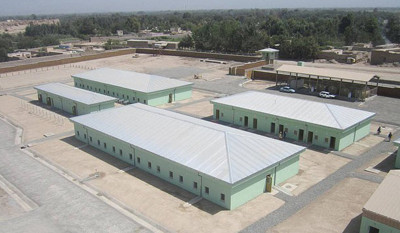The unprecedented $100 billion program slated to rebuild war-torn Afghanistan has been ravaged by theft, cost overruns, bribes, unused facilities and "incalculable waste," and now the federal auditor of the reconstruction effort is urging Congress to make sure taxpayers are getting their money's worth before spending more.
But, warned an urgently written quarterly report to Congress from the Special Inspector General for Afghan Reconstruction, even if Congress gives the OK, auditing how Afghanistan spends the largest rebuilding fund in U.S. history will be difficult after American troops leave in October 2013.

ABC News, Jan. 29, 2013: According to a report released today by the Special Inspector General for Afghanistan Reconstruction (SIGAR), the Imam Sahib Border Police Company Headquarters in the Kunduz Province in Afghanistan was meant to service 175 police officers when it was given over to Afghan authorities in September 2012. When SIGAR investigators visited the facility two months later, however, only "about" 12 officers were there and they said they were unaware of any plans to move any additional staff over. (Photo: Special Inspector General for Aghanistan Reconstruction)
The report from Special Inspector General John Sopko delivered Wednesday and provided to Secrets is the latest to detail widespread problems with the U.S. reconstruction fund and comes after one recent report identified massive thefts of fuel and another revealed a sprawling American-paid $7.3 million security facility built for 175 police but that holds just 12--who don't even have keys to all the buildings.
Said his audit: "While there has been major progress in Afghanistan, SIGAR's work since 2009 has repeatedly identified problems in every area of the reconstruction effort--from inadequate planning, insufficient coordination, and poor execution, to lack of meaningful metrics to measure progress. We have found delays, cost overruns, and poor construction of infrastructure projects. We have also found U.S.-funded facilities that are not being used for their intended purposes. These problems have resulted in lost opportunities and in incalculable waste, but they have also presented opportunities to learn."
Sopko said about $89 billion has already been appropriated, with over $50 billion slated to pay for Afghan police and national security. Among the questions he urges Congress to ask federal agencies involved in the effort are: "Does the project or program make a clear and identifiable contribution to our national interests or strategic objectives?" And, "Do the Afghans want it and need it?"
Should the Obama administration Congress give the green light to more spending, he warned that auditing the spending to prevent further waste and theft will be difficult because SIGAR relies on U.S. troops for security when touring violent areas.
"SIGAR is particularly concerned about the effect the military drawdown will have on our ability to oversee reconstruction spending. SIGAR and other oversight agencies depend in part on military transport and protection in regions outside Kabul. The shrinking U.S. military presence is already making it more difficult to visit reconstruction projects in remote locations," said Sopko in the introduction of his 202-page report.



